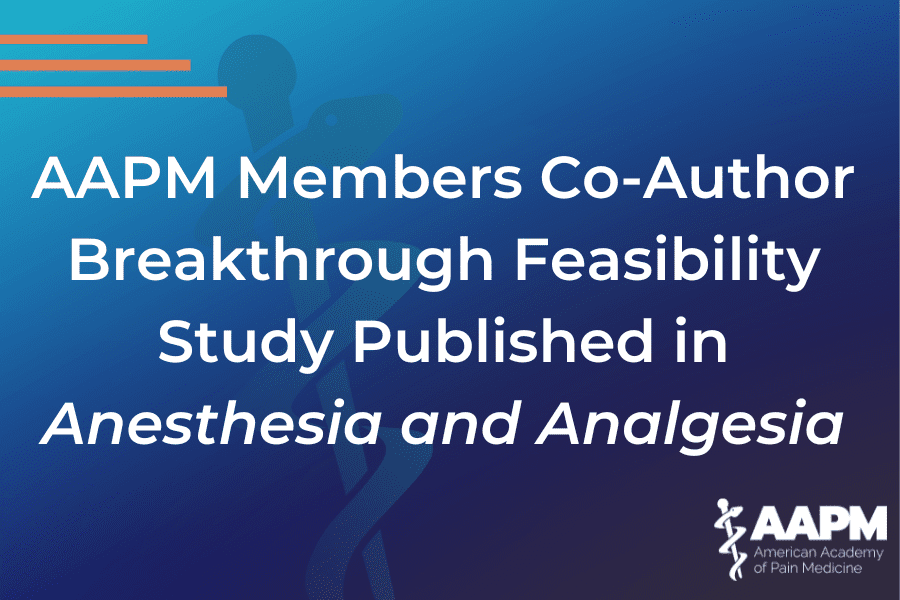 Enhanced Recovery After Surgery: New study suggests a single-session, digital pain management treatment provides lasting analgesia after orthopedic trauma surgery
Enhanced Recovery After Surgery: New study suggests a single-session, digital pain management treatment provides lasting analgesia after orthopedic trauma surgery
By Maisa Ziadni, PhD
Behavioral pain treatments may improve recovery from surgery. However, access to behavioral pain treatment access remains poor. Scalable and low-burden treatment options are needed to meet the call for accessible integrated perioperative pain care.1 Here, we report findings from our new study, published in Anesthesia and Analgesia,2 which tested the impact of a digital pain management intervention “My Surgical Success” following orthopedic trauma surgery.
Orthopedic trauma surgery is a relatively common procedure, with annual estimates suggesting that 16.2% of the roughly 7 million orthopedic injuries result in an urgent surgical procedure. For some patients, surgery will have poor surgical recovery and persistent pain. Up to 1 in 10 patients report moderate to severe pain 2 years after fracture surgery, and patients taking prescription opioids are more likely to report moderate to severe pain.
Dr. Darnall shares what My Surgical Success can contribute to lasting analgesia following surgery.
To address this need for improved analgesia, we sought to test the impact of a digital, automated pain management treatment My Surgical Success on pain intensity, opioid use, and recovery after surgery. We designed a robust randomized controlled trial to assess the efficacy of My Surgical Success compared to an active general health education intervention that involved no pain education or pain management skills. We enrolled 133 inpatients at Stanford University’s Orthopedic Trauma Surgery Unit who were preparing to undergo surgery; of whom 84 were randomized into one of the two study groups and completed study procedures.
What is My Surgical Success?
My Surgical Success is an adaptation of Empowered Relief, a 1-session skills-based pain relief class that has been shown clinically important reductions in pain and multidimensional symptoms 3 months after treatment in people with chronic pain. 3,4 Tailored to surgical patients, My Surgical Success included three brief patient videos (45mins total) that provided education on pain and skills on how to regulate cognition, emotion, and physiological hyperarousal related to pain and stress. Learners were guided to self-tailor the information using a personalized plan and were provided a 20-minute relaxation app for daily use in the months after surgery.
Stanford Chief of Orthopedic Trauma Surgery Dr. Michael Gardner, collaborator on the new My Surgical Success study, explains why this brief and automated patient education intervention is important for enhanced recovery after surgery – and what this study means to patients and the field.
Relative to other digital interventions, we found high patient engagement with My Surgical Success (63%), and patients reported high acceptability and satisfaction rates with the treatment (>80%). Overall, the My Surgical Success group had clinically meaningful reductions in pain intensity after surgery compared to the comparator health education group. The analgesic benefits of My Surgical Success remained durable at 3 months after surgery, the end of the study. Our findings suggest that a fully automated behavioral pain management skills intervention (MSS) may provide motivated orthopedic trauma surgery patients with reduced pain up to 3 months after surgery.
“Surgeons and hospitals are challenged with needing to provide effective whole-person pain management yet lacking solutions that their patients can receive on demand in the hospital or at home,” said Beth Darnall, PhD, Stanford Professor of Anesthesiology, Perioperative and Pain Medicine, creator of My Surgical Success and senior author of the study. “We are excited to see My Surgical Success contribute lasting analgesia after surgery.”
Previously, in a study published in Pain Medicine, My Surgical Success was shown to reduce time to opioid cessation in women after they received breast cancer surgery.5
References
1. Pain Management Best Practices Inter-Agency Task Force Report. 2019. https://public3.pagefreezer.com/browse/HHS.gov/31-12-2020T08:51/https://www.hhs.gov/sites/default/files/pmtf-final-report-2019-05-23.pdf
2. Ziadni M, You, DS, Keanne, RT, Salazar, B, Jaros, S, Ram, J, Roy, A, Tanner, N, Salmasi, V, Gardner, M, Darnall, BD. “My Surgical Success”: Feasiblity and Impact of a Single-Session Digital Behavioral Pain Medicine Intervention on Pain Intensity, Pain Catastrophizing, and Time to Opioid Cessation After Orthopedic Trauma Surgery – A Randomized Trial. Anesth Analg. 2022. June 13.;
3. Ziadni, Maisa S. PhD*; You, Dokyoung S. PhD*; Keane, Ryan BA*; Salazar, Brett BS†; Jaros, Sam BS‡; Ram, Jesmin BA*; Roy, Anuradha MSc*; Tanner, Natalie BA†; Salmasi, Vafi MD*; Gardner, Michael MD†; Darnall, Beth D. PhD* “My Surgical Success”: Feasibility and Impact of a Single-Session Digital Behavioral Pain Medicine Intervention on Pain Intensity, Pain Catastrophizing, and Time to Opioid Cessation After Orthopedic Trauma Surgery—A Randomized Trial, Anesthesia & Analgesia: June 13, 2022 – Volume – Issue – 10.1213/ANE.0000000000006088 doi: 10.1213/ANE.0000000000006088
4. Ziadni MS, Gonzalez-Castro L, Anderson S, Krishnamurthy P, Darnall BD. Efficacy of a Single-Session “Empowered Relief” Zoom-Delivered Group Intervention for Chronic Pain: Randomized Controlled Trial Conducted During the COVID-19 Pandemic. J Med Internet Res. Sep 10 2021;23(9):e29672. doi:10.2196/29672
5. Darnall BD, Ziadni MS, Krishnamurthy P, et al. “My Surgical Success”: Effect of a Digital Behavioral Pain Medicine Intervention on Time to Opioid Cessation After Breast Cancer Surgery-A Pilot Randomized Controlled Clinical Trial. Pain Med. May 13 2019;doi:10.1093/pm/pnz094
